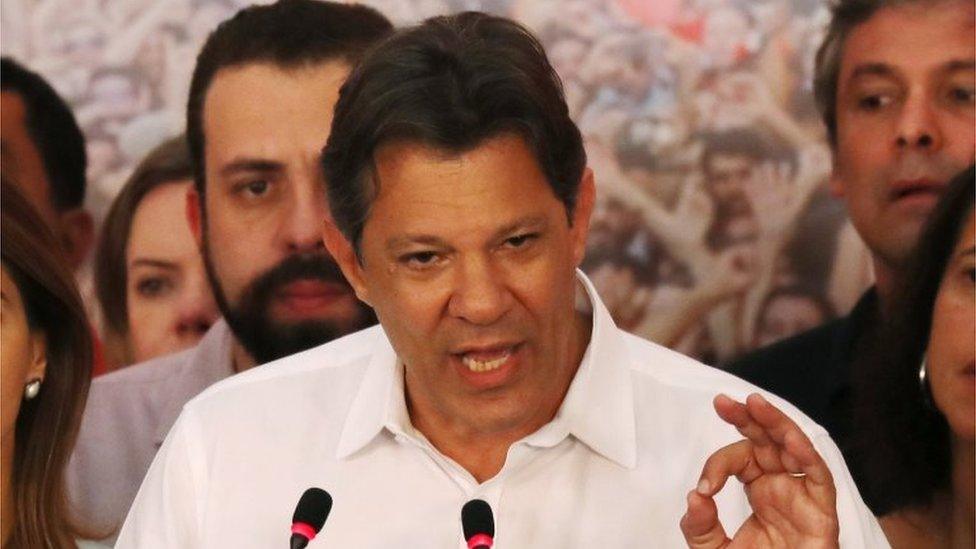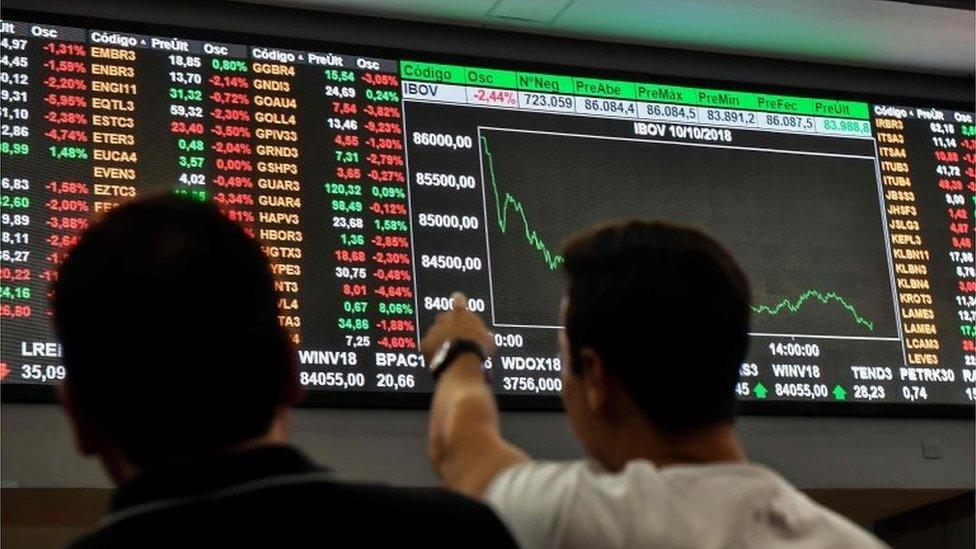Brazil economy: Can Bolsonaro ride the 'Bullsonaro wave'?
- Published

Supporters of Jair Bolsonaro have put their trust into him but will he be able to deliver?
If stock markets and currencies are anything to go by, Brazil's economy would at first glance seem like one of the best bets for investors at the moment.
While global markets have been experiencing sharp drops since September, Brazil's stock market and currency have both soared 13% in the same period.
Market analysts say this is just the beginning of the "Bullsonaro wave", the bullish trend of Brazilian stocks spurred by the election of far-right presidential candidate Jair Bolsonaro.
On 1 January, Mr Bolsonaro will be sworn in as president of Latin America's largest economy but will he be able to sustain that feeling in the business community?
Defeating the left
To say that opinions on Jair Bolsonaro are divided is a bit of an understatement. His views on women, race, religion, gun control and LGBT rights have caused outrage during the campaign.
But amongst market players, the 63-year-old former army captain is far less controversial. The vast majority of members of the business and financial community wanted to see him defeat Fernando Haddad, his rival from the left-wing Workers' Party, at the ballot.
The Workers' Party governed Brazil for 13 years and was in power during an era of great prosperity. But there is a broad consensus among the business community that the party was almost single-handedly responsible for the country's worst recession in history.

The business community backed Jair Bolsonaro over the Workers' Party candidate, Fernando Haddad (above)
The harshest criticism is directed against former President Dilma Rousseff and her spendthrift policies which turned Brazil's fiscal surplus into a ballooning deficit that is now crippling growth and job creation.
Business leaders historically sided with the pro-market centre-right party PSDB, which performed poorly this year. As Jair Bolsonaro began to emerge as the strongest anti-Workers' Party candidate, businesses enthusiastically embraced his campaign.
Can he do it?
Now that Mr Bolsonaro has been elected, market optimism is giving way to scepticism.
Far-right politician Jair Bolsonaro has won Brazil's presidential election. But who is he?
To lead the economy, Mr Bolsonaro - who has said himself that he does not understand much about economics - has chosen Paulo Guedes, a successful banker with a long history in financial markets.
Mr Guedes has promised a host of pro-market reforms - formal independence of the central bank, privatisations, reduction in tax exemptions to industries, tax simplification and pension reform.
But it will take arduous work to reform Brazil's economy.
Brazil remains one of the most closed economies in the world and many of the industries that supported Mr Bolsonaro's rise to power are likely to resist reforms that remove government subsidies, increase international competition or promote tax increases.
Mr Bolsonaro and Mr Guedes also promise a new comprehensive reform of the pension system, a system which contributes greatly to Brazil's fiscal problem.
Brazil's Congress has in the past resisted any deep changes to pension rules, even in periods when the current president, Michel Temer, was able to wave the promise of patronage and other favours in front of members of Congress in exchange for their votes.
Mr Bolsonaro is likely to face an uphill struggle to see his reforms through. Not only has he yet to come up with a new pension plan, he will then have to push it through a Congress in which he lacks a majority. And he has promised to do so by bringing in a new approach to bargaining with lawmakers, ditching the old ways of pork barrel politics.
Friendly fire
To make matters worse, even before his victory in Sunday's election, there was infighting within his camp.
During the campaign, various of his allies suggested Mr Bolsonaro would adopt policies such as bringing in new taxes or putting a stop to end-of-year wage bonuses.
Mr Bolsonaro had to come out and disavow his allies but he again failed to lay out any specific policies.

The São Paulo stock exchange took a dip when Mr Bolsonaro rowed back on some of his allies' promises
Shortly after the election, Paulo Guedes spoke to the press about his plans to privatise companies and to bring down Brazil's budget from its current $37bn (£29bn) deficit "to zero" in 2019 through spending cuts. Again, there were no specifics.
"We have been given an outline but we haven't been given any details," says Zeina Latif, an economist at XP Investimentos.
International market analysts are taking notice. "Uncertainties remain over the pace and depth of reforms at a time when deficit and debt pressures are high," wrote credit ratings agency Fitch on Monday.
"How effectively the new administration is able to use the honeymoon period to prioritise and pass its economic agenda remains uncertain.
"The ability of the president-elect to form an effective coalition to pass key economic bills early in the term will be an important early gauge for the overall commitment...
"However, the exact details of how his administration plans to achieve these objectives are limited," Fitch concluded.
Moody's Vice-President Samar Maziad also hedged his bets: "Although we expect broad policy continuity, the ability to build support in Congress to approve fiscal reform remains untested."
Brazil's economy is in deep economic trouble. Its GDP shrank by almost 8% in the recent recession and recovery is still very modest.
More than 12 million people are out of work and informality is growing in the labour market.
It will take a lot of hard work for the "Bullsonaro wave" in the financial markets to produce ripples in the real economy.